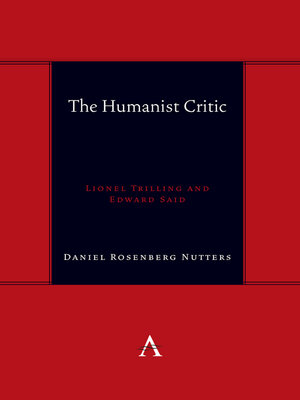The Humanist Critic
ebook ∣ Lionel Trilling and Edward Said · Anthem symploke Studies in Theory
By Daniel Rosenberg Nutters

Sign up to save your library
With an OverDrive account, you can save your favorite libraries for at-a-glance information about availability. Find out more about OverDrive accounts.
Find this title in Libby, the library reading app by OverDrive.



Search for a digital library with this title
Title found at these libraries:
| Library Name | Distance |
|---|---|
| Loading... |
The Humanist Critic examines the careers of Lionel Trilling and Edward Said in two contexts: on one hand, it focuses on the changing shape of literary criticism as it occurred alongside the advent of critical theory and, on the other hand, it addresses each critic's understanding of the gradual emergence of modernism in the nineteenth-century. Nutters argues that Trilling and Said each drew upon their favorite modern writers to reimagine the role of the humanist tradition at a time when the academic study of literature began to lose faith in humanism and fragment. The Humanist Critic thus studies the influence of Matthew Arnold and Thomas Mann on Trilling and the influence of Joseph Conrad and Gerard Manley Hopkins on Said while putting the careers of Trilling and Said in dialogue with structuralist and deconstructive thought. The Humanist Critic is ultimately a focused genealogy of literary studies; a study of influence; a critique of current trends in critical culture; and a renewed justification for the humanist vocation.







